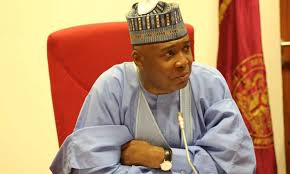The Federal High Court in Abuja has restrained the Economic and Financial Crimes Commission and other agencies involved in the probe of Senate President Bukola Saraki over corruption allegations.
Saraki on Friday filed two separate fundamental rights enforcement suits before the court to challenge the decision of the EFCC to seize his houses.
Ruling on an ex parte application filed along with the substantive suit by Saraki, Justice Taiwo Taiwo, on Tuesday ordered the anti-corruption body and the other five respondents to the suit to stay action on the probe pending the hearing and determination of the motion on notice filed by the applicant.
The judge made the order after hearing Saraki’s lawyer Sunday Onubi, who moved the application.
The six respondents to the suit affected by the restraining order are the Attorney General of the Federation, Mr Abubakar Malami (SAN), Department of State Services, Inspector-General of Police, Muhammed Adamu, EFCC, Independent Corrupt Practices and other related offences Commission and Code of Conduct Tribunal.
In a ruling delivered by the judge on returning to the courtroom after taking about 45 minutes to prepare it in his chambers, the court likened the restraining order issued on Tuesday to an order directing the parties to the suit to maintain the status quo in respect of the probe.
Ordering them to suspend the probe, Justice Taiwo said he granted Saraki’s prayers to avert a situation where the court would be faced with a situation of fait accompli.
He added that granting the order was in line with a settled principled of law that once a suit was filed, all parties to it must refrain from taking any action capable of rendering the suit nugatory.
According to him, the order amounts to an order directing the parties to maintain the status quo.
He added that the law allows such an application to be granted in a situation where the applicant would likely face “hardship” between the time of serving processes in the suit on the respondents and hearing and determination of the suit.
He ruled, “There is no doubt that the Fundamental Rights Enforcement Procedure Rules 2009 is a special proceeding with its stated rules and procedure.
“By the provision of Order 4(3) of the Fundamental Rights Civil Procedure Rules, 2009, the court may, if satisfied that the applicant may be caused hardship before the service of an application where liberty or life of the applicant is involved hear the application ex parte upon such interim reliefs as the justice of the application may demand.
“There is no doubt that in making the interim reliefs or orders, the court is guided even in its exercise of its discretion judicially and judiciously applied by the law and statues.
“Here comes in the rules and of course Constitution of the Federal Republic of Nigeria.”
He added, “I am of the view, after due consideration of the aforesaid averment, that this court ought to make the order being sought by the applicant pending the hearing and determination of the originating motion on notice.
“To do otherwise and not to restrain the respondents by asking them not to stay action will result in the court being faced with a fait accompli.”
The judge made the same set of orders in the two separate suits marked FHC/ABJ/CS/507/2019 and FHC/ABJ/CS/508/2019, filed by Saraki, which were separately argued and ruled upon on Tuesday.
Justice Taiwo then directed the applicant to serve the court processes on the six respondents who he also directed to file their response within five days of being served.
He adjourned further hearing till May 23, 2019 when the respondents will have an opportunity to challenge the ex parte order by arguing their objection to Saraki’s motion on notice. – Punch


